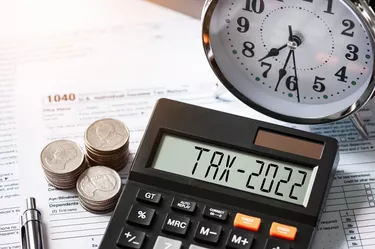
If you meet or go over certain income levels, you'll need to file a federal income tax return this year. Whether you do your own taxes or have a certified public accountant (CPA) do your tax preparation, there is some tax information you'll need to know and provide. Help from the IRS at IRS.gov is available if you have questions.
Employer Supplies W-2 Form
Video of the Day
If you have a job, you will receive a W-2 Form from your employer. If you have more than one employer, you will receive a W-2 Form from each one.
Video of the Day
The W-2 Form is a wage and tax statement your employer must file for you and every employee who had income, Social Security or Medicare tax withholding from their paycheck.
Federal tax law requires your employer to supply a W-2 Form to employees by Jan. 31. An employer may ask for an extension, but the IRS doesn't have to grant it.
Self-Employed Use 1099 Form
Taxpayers who are self-employed contract workers will receive Form 1099-NEC from the person or company that paid for services. The 1099 will act instead of the W-2 Form when filing individual income tax.
Consider also: IRS Rules on Paying 1099 & W-2 Employees
Standard IRS Forms
The income tax form that most filers will need is Form 1040. A tax professional will use this form to file a basic income tax return. There are many ways to report income on Form 1040. Have all your income statements available when filing your tax return.
If you have miscellaneous income, you'll also need to file Form 1099-Misc in conjunction with your 1040. This would be for income that is $600 or more such as:
- rental property
- prize money
- cash payment for fish
- other income payments
- and others
Form 1099–NEC means nonemployee compensation. This is the form you will receive from an individual or company that has paid you $600 or more. If you qualify to pay taxes, you'll still need to declare any income.
How to Find Tax Forms
An income tax filer can order forms from the IRS in various ways.
Requesting a form electronically is the easiest and fastest way to get an IRS tax form. Forms like 1040 as well as information, can be downloaded. You can also request a tax form by U.S. mail.
The phone is another way to request an income tax form or tax publication. Make a list of what you need before you call. The number is 800-Tax-Form (800-829-3676).
A filer can find the commonly used forms from a library or IRS office. But they may only carry the most widely used form. This is Form 1040, which is the U.S. individual income tax return most commonly used.
Consider also: Different Types of Form 1099
Even if you are below the required income to file, consider filing.
Help With Tax Filing
There are numerous tax professionals, including CPAs, that you can hire to prepare your taxes.
If you can't afford a tax professional or have other limitations, but you need tax help, the Volunteer Income Tax Assistance (VITA) program is an option.
It is for individuals who earn $54,000 or less. Individuals with disabilities, the elderly or taxpayers who have limited English can also use VITA.
Volunteers who are IRS-certified provide basic tax return preparation. Then, they e-file the tax return. The service is free.
Another service available for individuals 60 or over is the Tax Counseling for the Elderly (TCE) program. The IRS provides funds to reimburse volunteers for their out-of-pocket expenses. This reimbursement from the TCE allows the volunteers to travel to locations convenient for the senior taxpayers.
Consider also: Do You Qualify for the Earned Income Tax Credit?
File for Tax Credits
Even if you are below the required income to file, consider filing. Some credits can be applied that may benefit you.
One of these is the Earned Income Tax Credit (EITC). This is for individuals with low or moderate income.
There is also the Child Tax Credit and the Child and Dependent Care Credit. Both can be worth thousands of dollars to qualifying individuals and families. You could qualify for all three credits.
- IRS: How Can We Help You
- IRS: About Form W-2 Wage and Tax Statement
- Social Security: Deadlines to File W-2s
- IRS: 1040 and 1040-SR
- IRS: About Form 1099-Misc, Miscellaneous Income
- IRS: Forms, Instructions & Publications
- IRS: Forms and Publications by U.S. Mail
- Benefits: Volunteer Income Tax Assistance (VITA)
- Tax Outreach: EITC Eligibility Checker